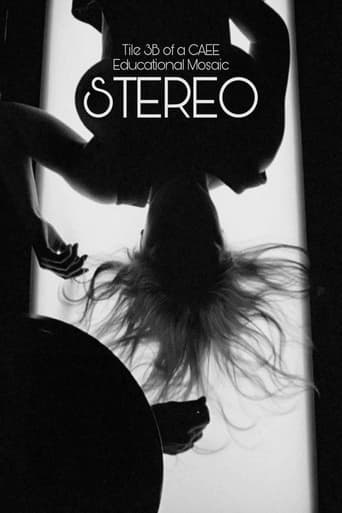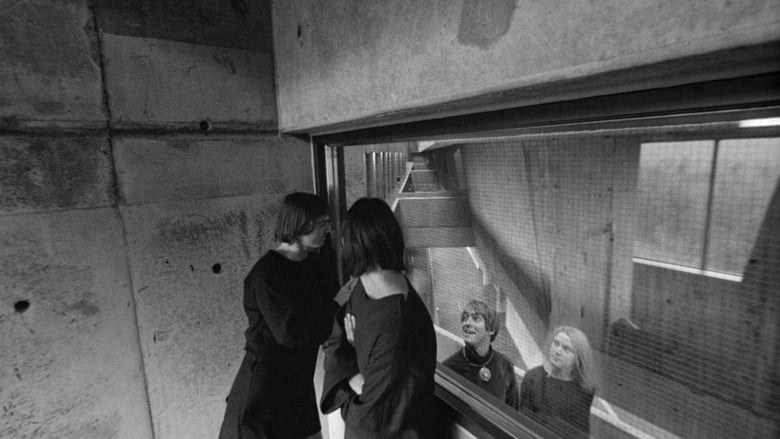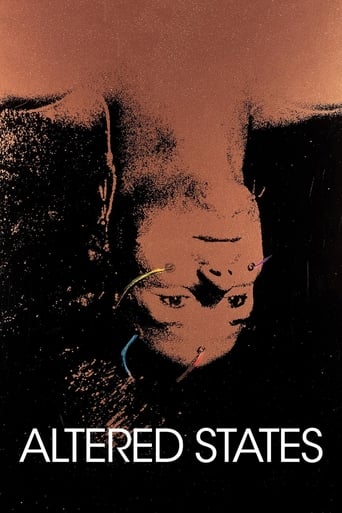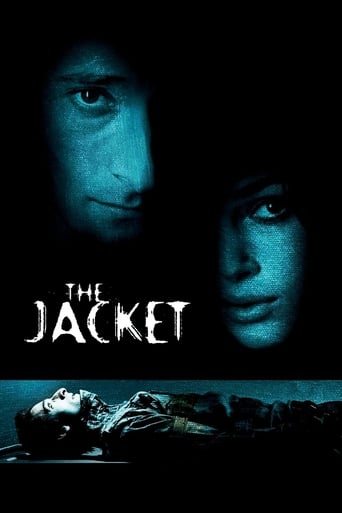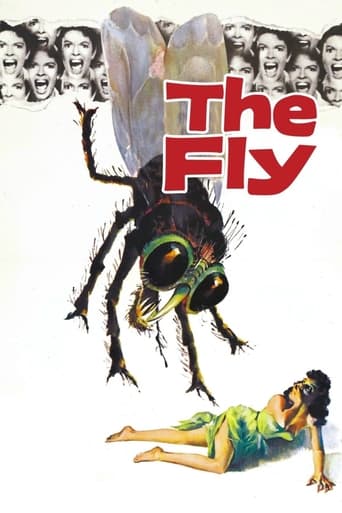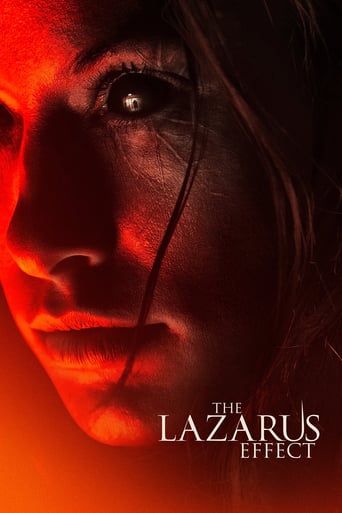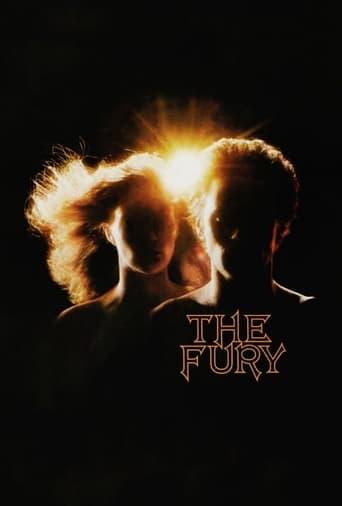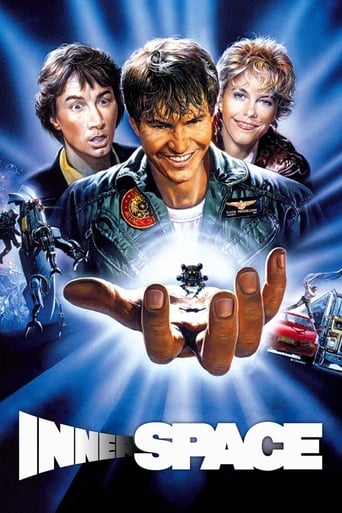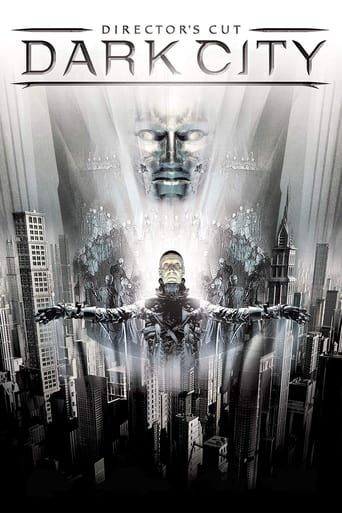Stereo (Tile 3B of a CAEE Educational Mosaic) (1973)
A group of Canadian university students agree to partake in a grisly psychological experiment, which renders them incapable of speech but able to communicate telepathically.
Watch Trailer
Free Trial Channels
Cast


Similar titles
Reviews
Excellent but underrated film
What a freaking movie. So many twists and turns. Absolutely intense from start to finish.
All that we are seeing on the screen is happening with real people, real action sequences in the background, forcing the eye to watch as if we were there.
.Like the great film, it's made with a great deal of visible affection both in front of and behind the camera.
(Due to IMDb word limits, Part 1 of this essay can be found in my review of "Eastern Promises") Even when Viggo enters the low tech world of the East, he is astoundingly high tech. In a world of knives, Viggo is a cyborg, our post "Existenz" society already producing biotechnological entities. Think the film's cunning ending: Naomi Watts - already identified as a butch lesbian by David Lynch - becomes not the simulation of heterosexual domesticity seen at the end of "A History of Violence", but a husband-less, (she lives with uncle, mother and child) poster-girl for the androgynous, fragmented future of digital capitalism.By inter-cutting Naomi's goofy simulacrum with a scene of Viggo sitting mournfully at a table, the following question arises: at what price does Viggo establish his neutral status? Does he lose humanity in the process? Is this loss negative? The film's ending, in which Viggo is revealed to be both criminal and cop, good and evil, but neither gangster nor cop, neither good nor evil, suggests a profound loss of humanity. Motionless and seemingly on the verge of tears, Viggo now resembles Verhoeven's "Robocop", reminiscing about what it once was like to be human. In other words, in accepting his neutral status, Viggo removes himself from Naomi, resulting in a kind of further androgynous disassociation. By living in the network society of the West, you're already atomised and mechanised. When you buy cola from the dispenser, you're servicing the Machine, you are its corporeal extension, just as Viggo is now the limb of two warring, nationalist machines. Between one socio-technological agency dominating the other, between DNA programming and competing sociocultural and economic structures that build on this biological instinctive substrate, the film says, there's no place for human subjective agency. As Viggo mourns, "I am neither alive nor dead. I've been living in the zone since I was fifteen." In a scene in which rival football hooligans macho-stomp through a cemetery, we sense the film's repressed xenophobia and nationalist passions. What "Eastern Promises" promises is a new Cold War: America and the Eastern World in civilisational clinch, in which the West will righteously and bravely undergo a little barbarism, a little queerness, in order to protect its children. And propping up this noble fantasy will be a legion of little Viggo's, socially and psychologically fragmented but better off than the dirty few who are seduced by the false promises of the West only to end up as property at best, dead or sex workers at worst.What Cronenberg unintentionally captures is the shift away from Michel Foucault's "disciplinary society" (the film's East) and towards a new sort of social formation, which Gilles Deleuze calls the "control society" (the film's West). Whilst the "disciplinary society" operates by organising major sites of confinement (family, school, hospital, factory, prison etc) in which individuals are always going from one closed site to another, each with its own laws etc, the "control society" breaks down all sites of confinement such that ultra rapid forms of apparently free-floating control take over.The differences between these two forms of social organisation, between Viggo and the film's Mafia Chief, are numerous. Where the disciplinary society was analogical, the control society is digital. Where the disciplinary society was traditional and focused on stability, the control society stresses movement, fragmentation and capital. Where the disciplinary society is closed, traditional and hierarchical, the control society is open, fluid, schizophrenic and rhizomatic. Where the disciplinary society applied rigid molds as forms of confinement, the control society is always in a state of flux, always destroying and rebuilding. Likewise, while the disciplinary society molds the individuality of each person, the control society addresses us instead as what Deleuze calls "dividuals", identities constantly multiplied, decomposed and recomposed on various levels (medical records, credit cards, internet, email, passwords replacing signatures, each identity used for different purposes etc).This is best seen in the way the film's Mafia Chief mourns the way London "infects his macho son", "breaks him down" and "rebuilds him queer" and the way the Mafia relies on codes, tattoos and rituals to "rigidly build" its own people. In contrast, Viggo not only belongs to the control society, but has mastered it absolutely. He is able to ride the flux, precisely because he's supremely disassociated; alienated from mind and body.Everyone is subject to the master signifier. To stay alive in the game one has to renounce a measure of pleasure and power; to be castrated, whether male or female. So though "Promises" start out with the feminization motif - the knife slice, the bleeding vagina, the whorification of Viggo, the queering of the son – it, along with Cronenberg's entire filmography, gradually moves to outright impotence. The son is a voyeur, can only watch, can't do anything for himself, can't even kill a baby, while the mother (Naomi Watts) is barren and Viggo has been neutered by the Big Other, his body inscribed with tattoos which attest to a false history, false "tags" of ownership etc. Supremely divided, Watts and Viggo are the new "sucessful" mother and father, "parenting" a child that doesn't belong to them, without being married, living worlds apart, without even knowing one another. In this way castration is redefined in terms of territorialization. Territory is incessantly "deterritorialized" by the unspoken logic of global capitalism, everything is broken down and fragmented, but always allowing for the free flow of desires toward creation/procreation and production/reproduction, which we see in the last scene. The family is nobly destroyed, and what remains is only enough to keep it productive.9/10 – Though one of Cronenberg's best, "Promises" is too tightly packed, lacking any critical distance or space for a Western audience (whom the film primarily critiques) to reflect properly on its fantasies.(For Part 3 of my Cronenberg quest, see my review of Cronenberg's "Crash")
This strange gem fits suitably in the creche of Cronenberg bit it's not for everyone that loves Cronenberg....Just the ones that are insanely in need of everything he has ever created. Its not because it's a bad film, on the contrary it is very intriguing. Its just incredibly slow and the sparse environment lack of color and mostly silent audio makes for a surreal but not very compelling film. There is no soundtrack...At all. There is no real dialog just moments of narration, which of course paints the picture moreso than the acting and mise en scene. Set in the Future, we are treated to a pseudo-documentary based on the scientific workings of a parapsychologist named Luther Stringfellow a famed member of the fictitious Canadian Academy for Erotic Inquiry. His thesis; It is hoped that telepathic groups, bonded in polymorphous sexual relationships, will form a socially stabilizing replacement for the "obsolescent family unit". The subjects will be seven young volunteers who will submit to experimental brain surgery to endow them with telepathic abilities and quench their ability to speak and be recorded daily. The film serves as a record of said experiment. This is where the film kinda falls down. The film gives us some interesting characters to watch, but their silence doesn't allow us to really know sympathize with them. Its like watching an acting class exercise in "emoting" or "mugging". A pantomime this complex needs some form of interpretive audio. While it is interesting to watch the actors go about their "telepathic" play, the drama comes off as stilted due to the highly scientific nature of the narration. Some long sequences that involve little or no narration do not pass quickly and create a kind of dream logic between film and audience. Are we getting what he is showing us? I dunno, as some of the action is so interpretive that we could be on a completely different plane of reasoning than what Cronenberg could be trying to describe. Heady, perhaps, but I think that Cronenberg was not trying to be pretentious, I think he was doing what a lot of first time film students do. Get in over their heads with grand ideas. I can forgive as I have done that myself, which is why I gave it 7 stars. Its not bad its just not for everybody.
Sometime in the future, the Canadian Academy for Erotic Inquiry is investigating the theories of parapsychologist Luther Stringfellow. Seven young adults volunteer to submit to a form of brain surgery that removes their power of speech but increases their power for telepathic communication. If you are looking for a film to show at a party, this is not that film. It is black and white, slow-paced and almost entirely silent. Your party people will fall asleep and call you a loser.If you are someone who loves David Cronenberg or enjoys the study of film and camera techniques, I think you might find an interesting film here. While set up as a faux documentary about the study of "telepathists" at the "Center for Erotic Inquiry", there is very little plot and mostly just interesting scenes and visuals.Watch the lighting, angles. Pretend you are a guest in the room, a voyeur but not a participant. Notice the dark and creepy feel, despite the fact the story itself is not creepy and no music is added. The angles and lighting alone can give the feeling of darkness and depression.A beautiful film, and one that really laid the foundation for the next thirty years of Cronenberg greatness. His themes of medical oddities, unusual science and body horror are evident here. The exploration (voluntary or otherwise) of new states of consciousness via sexual experimentation is a major theme in "Shivers", "Videodrome", "Dead Ringers", "Naked Lunch", "M. Butterfly" and "Crash". To understand Cronenberg, one must understand this film.
"Stereo" is an underrated early Cronenberg movie. People tend to find it inaccessible on the grounds that it is 'boring', or due to its quasi-intellectual voice-over soundtrack (which was applied since Cronenberg did not have enough money to spend on soundtrack film) or 'incomprehensible' plot. The voice-over naturally enhances the feeling of "verfremdung", which can be argued as being for the good of the final result.The topic of a Canadian Academy for Erotic Inquiry is an extremely difficult one to pull off. The way it's made, however, with its austere milieu, its quasi-academic speaker voice and the contrasts between the harsh milieu and the characters' pursuit of the topic of the 'plot' makes it a rather good film its sparse conditions for creation considered, all the more if one is into austere films rather than bombastic ones. Hopefully some 'madwoman' or 'madman' will release a few copies of this movie on dvd, someday.

